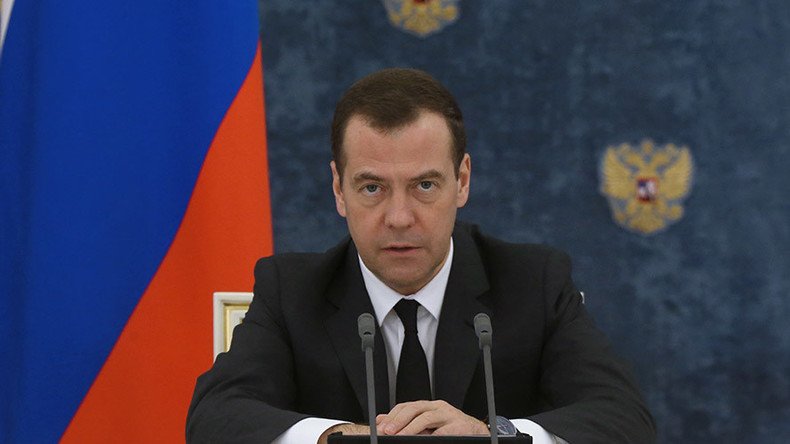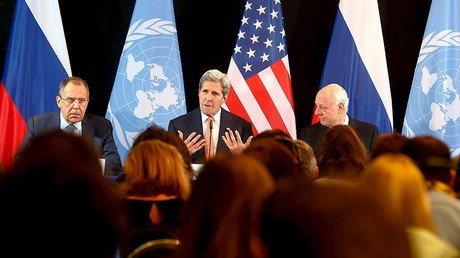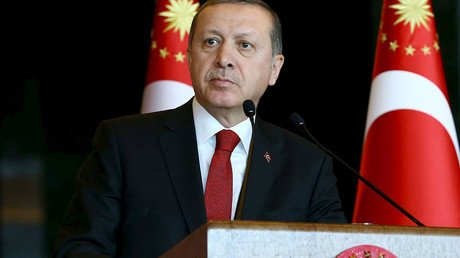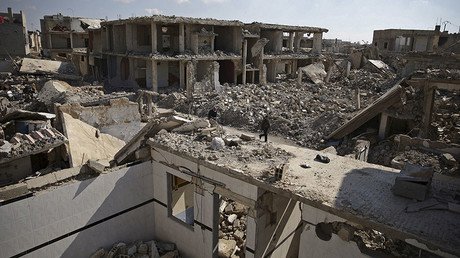Russian PM warns US, Saudis against starting ‘permanent war’ with ground intervention in Syria

Russian PM Dmitry Medvedev told German media that sending foreign troops into Syria could unleash “yet another war on Earth.” The warning follows increasingly aggressive statements made by Saudi Arabia and Turkey amid Bashar Assad’s gains in Aleppo.
“All sides must be compelled to sit at the negotiating table, instead of unleashing yet another war on Earth,” Medvedev told Germany’s Handelsblatt newspaper. “Any kinds of land operations, as a rule, lead to a permanent war. Look at what’s happened in Afghanistan and a number of other countries. I am not even going to bring up poor Libya.”
The PM was commenting on recent statements from Saudi Arabia claiming that it was ready to send ground troops to Syria, should Washington lead the way.
“The Americans and our Arab partners must think well: do they want a permanent war? Do they think they can really quickly win it? It is impossible, especially in the Arab world. Everyone is fighting against everyone there,” Medvedev added. The interview was published on the eve of the International Syria Support Group meeting in Munich, where the cessation of hostilities in Syria became a top item on the agenda.
Meanwhile, the situation in Syria has been heating up, as Syrian government troops have been making advances in the northern city of Aleppo, half of which is considered to be under the control of anti-government rebel groups. The same region has also been inundated with terrorist groups, such as Islamic State (IS, formerly ISIS/ISIL), Ahrar al-Sham, and Al-Nusra Front, which are all being targeted by Russian as well as US-led air campaigns.
At the same time, the predominantly Kurdish Syrian Democratic Forces (SDF) have recaptured a former military airbase from jihadists near the Turkish-Syrian border, reportedly with the support of Russian air strikes. The base is located near the rebel-held town of Azaz in Aleppo province.
Turkey, meanwhile, continues to insist that the Kurdish militia fighting IS are terrorists just as the Kurdish rebels fighting inside Turkey. Ankara, which has been criticized for bombing Kurds inside Syria instead of helping to fight IS, has recently fallen out with Washington over America’s support for the Kurdish YPG.
On the Syrian battlefield, Turkey openly supports anti-Assad rebel groups. The latest statement by Turkish PM Ahmet Davutoglu, who pledged to return a “historical debt” to Turkey’s “Aleppo brothers,” gave new rise to speculations over a looming Turkish ground invasion of Syria.
The situation has prompted fears of a possible military clash between world powers backing different sides of the Syrian conflict, with hopes that the Munich talks could de-escalate the deadlock. While some Western leaders have openly called upon Russia to stop supporting Assad with airstrikes, the communique that was agreed upon after five long hours of discussions does not directly mention any downsizing of strikes. Instead, it calls for a “nationwide cessation of hostilities” over the period of one week, although it exempts terrorist groups from the potential ceasefire.
MORE: 2 warlords killed during Russian airstrikes in Syria https://t.co/18kg7qXu6Epic.twitter.com/4IgCqqEyL6
— RT (@RT_com) February 11, 2016
In the latest alarming episode, Russian and American militaries traded accusations over the bombing of civilian infrastructure in Aleppo. Russia’s Defense Ministry said two US Air Force A-10 warplanes had destroyed nine facilities in the city, with the Americans shifting the blame onto Russia’s air campaign afterwards. Russian jets, however, had not targeted any civilian areas and were operating 20 kilometers away, according to the ministry. The spat started on Wednesday with the US alleging the destruction of “two main hospitals in Aleppo by Russian and regime attacks.”
From February 4 to 11, the Russian Air Force performed over 500 sorties, eliminating nearly 1,900 terrorist facilities in the Syrian provinces of Aleppo, Latakia, Hama, Deir ez-Zor, Daraa, Homs, Al-Hasakah and Raqqa, Russian Defense Ministry spokesman Igor Konashenkov said on Thursday.
MORE US planes entered Syrian airspace from Turkey, flew to Aleppo & bombed targets there https://t.co/18kg7qXu6Epic.twitter.com/npgnXg5MBV
— RT (@RT_com) February 11, 2016
Meanwhile, the US is seeking to boost the anti-Islamic State coalition it is heading in Iraq and Syria by officially drawing in NATO as a member, AFP reported. While some NATO member states are already active members of the coalition, the military alliance’s chief, Jens Stoltenberg, said their increased role could bring “significant development” and “unique capabilities” which include “building partner capacity, training ground forces and providing stabilization support.”
US Defense Secretary Ashton Carter has been lobbying for greater participation by NATO in the war on Islamic State, giving a dramatic Thursday speech on “a new stage in the coalition campaign to defeat ISIL” and adding the countries would then be able “look back after victory and remember who participated in the fight.”
The alliance, however, has already found itself in one uneasy situation related to the conflict, when it had to back Turkey’s downing of a Russian Su-24 bomber that was striking militant positions in Syria. While Ankara rushed to seek NATO’s support following the aggressive and clearly avoidable move, and the bloc delivered this support on an official level, reports cited sources taking part in a NATO emergency meeting at the time as expressing discontent with the rash unilateral move by the Turks. Turkey has since stopped its sorties into Syria in what some attribute to the dispatch of the Russian S-400 air defense systems there, but also due to the pressure by Ankara‘s NATO allies to follow the bloc’s more cautious rules of engagement.
LISTEN MORE:















